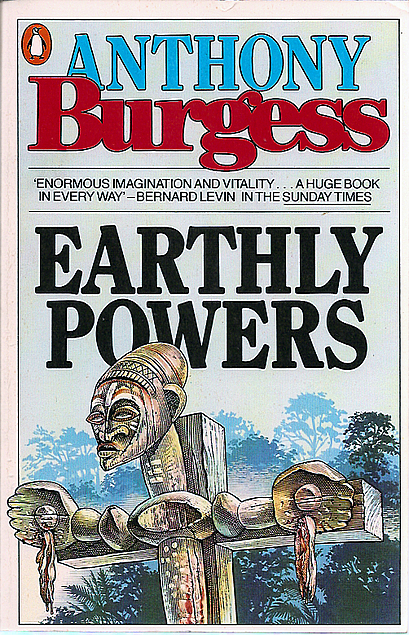Anthony Burgess "Earthly Powers" (Vintage Books)

Earthly Powers is the linchpin of Anthony Burgess's novel-writing career. It is a massive work that compares favorably with similar tomes of twentieth-century literature. It has taken me a few months to get through this doorstop of a novel.
What sets Burgess apart from other authors is his linguistic playfulness combined with an exceptional narrative style. Although this style is here somewhat less obviously experimental than that of Burgess’s other novels of this period, his use of a professional storyteller as a first-person narrator allows him to call into question the nature of authority in fictional texts. The narrative becomes a retrospective account of a life spent as an outsider.
Within that account, Burgess locates his protagonist, Toomey, at some key moments of twentieth-century history in order, it seems, to comment on those issues which consistently surface in all of Burgess’s fiction, particularly the nature of evil and its presence in the physical world. The novel attempts to address issues of belief, and the role of religion in late twentieth-century culture, using a broad sweep of characters, fictional and real; it is not, however, a roman à clef. Though often mentioned in reviews of this novel, the identification of Toomey with Somerset Maugham fails to recognize that Toomey is a portmanteau of many characters. He contains hints of Maugham, certainly, but there are suggestions of, to name a few, Alec Waugh in the precocious young novelist; of P. G. Wodehouse in the broadcaster from Berlin; of W. H. Auden in the rescuer of a Nobel laureate’s offspring; and of Burgess himself, the author of a real Blooms of Dublin.
Burgess's ability to meld this amalgam of characters into his protagonist reminds me of another favorite novel, The New Confessions by William Boyd, in which the author uses a similar technique to create a tremendously exciting and interesting protagonist. Throughout the novel, the emphasis is on the debate about the nature of evil rather than on the accuracy or otherwise of the references to twentieth-century figures. The novel examines at length the nature of belief, the way in which people cope with an imperfect world, and the operation of evil and suffering. In doing so it succeeds in presenting a distinctive and compelling view of the twentieth century through the life of Toomey.
It is both a challenging and rewarding read that I would recommend to all.

Earthly Powers is the linchpin of Anthony Burgess's novel-writing career. It is a massive work that compares favorably with similar tomes of twentieth-century literature. It has taken me a few months to get through this doorstop of a novel.
What sets Burgess apart from other authors is his linguistic playfulness combined with an exceptional narrative style. Although this style is here somewhat less obviously experimental than that of Burgess’s other novels of this period, his use of a professional storyteller as a first-person narrator allows him to call into question the nature of authority in fictional texts. The narrative becomes a retrospective account of a life spent as an outsider.
Within that account, Burgess locates his protagonist, Toomey, at some key moments of twentieth-century history in order, it seems, to comment on those issues which consistently surface in all of Burgess’s fiction, particularly the nature of evil and its presence in the physical world. The novel attempts to address issues of belief, and the role of religion in late twentieth-century culture, using a broad sweep of characters, fictional and real; it is not, however, a roman à clef. Though often mentioned in reviews of this novel, the identification of Toomey with Somerset Maugham fails to recognize that Toomey is a portmanteau of many characters. He contains hints of Maugham, certainly, but there are suggestions of, to name a few, Alec Waugh in the precocious young novelist; of P. G. Wodehouse in the broadcaster from Berlin; of W. H. Auden in the rescuer of a Nobel laureate’s offspring; and of Burgess himself, the author of a real Blooms of Dublin.
Burgess's ability to meld this amalgam of characters into his protagonist reminds me of another favorite novel, The New Confessions by William Boyd, in which the author uses a similar technique to create a tremendously exciting and interesting protagonist. Throughout the novel, the emphasis is on the debate about the nature of evil rather than on the accuracy or otherwise of the references to twentieth-century figures. The novel examines at length the nature of belief, the way in which people cope with an imperfect world, and the operation of evil and suffering. In doing so it succeeds in presenting a distinctive and compelling view of the twentieth century through the life of Toomey.
It is both a challenging and rewarding read that I would recommend to all.